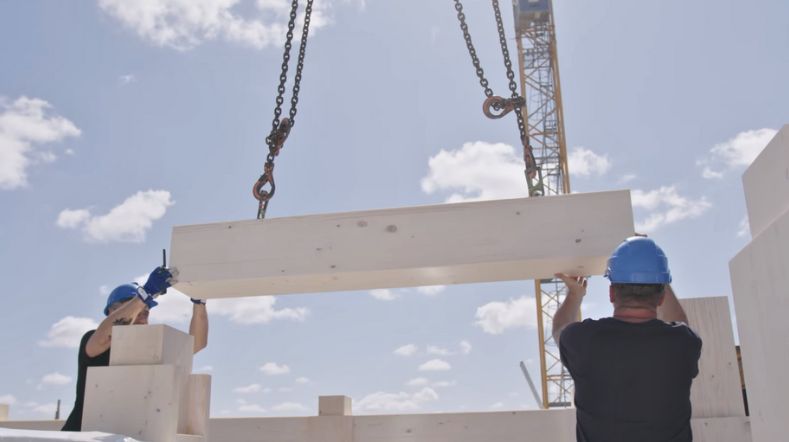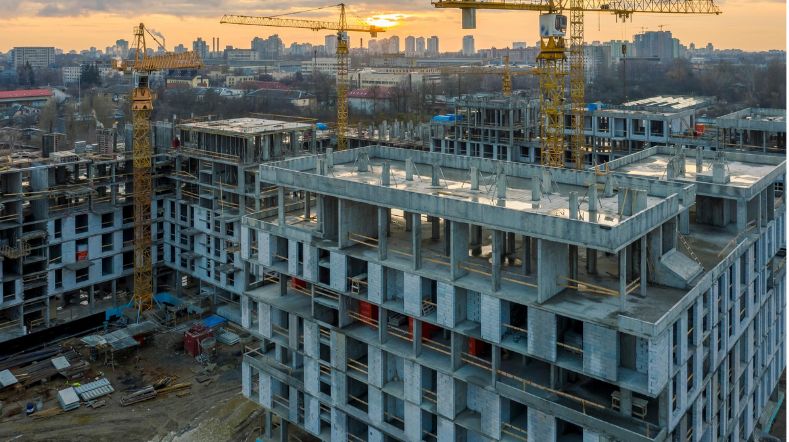
Industrial construction for a faster, affordable, and sustainable construction sector
The construction industry needs to build more affordable and sustainable housing, and fast – but traditional construction methods alone won’t cut it. Fortunately, industrial and conceptual construction offers promising advantages for the entire construction process, from development to delivery. Thanks to TNO’s expertise in industrialisation and digitalisation, the latest technologies can be put to best use, enabling the construction industry to build more affordable and more sustainable homes faster.
What is industrial and conceptual construction?
Industrial and conceptual construction means that homes are designed, configured, built, and assembled in a standardised and efficient way. The homes are prefabricated, brought to the construction site, and put in place. This process not only minimises nitrogen and CO2 emissions on site, but also speeds up construction time, lowers costs, and increases the quality and durability of the homes.
Advantages of industrial and conceptual construction
The current planning procedures and project-orientated way of building are proving to be a hindrance in the Netherlands’ huge housing and sustainability challenge. With industrial and conceptual construction, we can largely remove these barriers and achieve the following benefits:
Developing, designing, planning, and coordinating construction projects often takes longer than the actual construction. By developing standardised housing concepts suitable for industrial construction methods, homes can be put up faster, smarter, and with a smaller scope for error. In doing so, we support everyone involved ‒ from the municipality to the construction engineer ‒ with digital tools such as parametric design, automatic permit checks, and building information modelling (BIM). This significantly shortens the lead time, streamlining the flow from idea to handover.
One of the ways to reap the benefits of conceptual construction methods is to change the way we put contracts out to tender. This leads to increased demand predictability and continuity, paving the way for investment in configurable housing and the automated processes that go with it. By digitalising processes and deploying technologies such as AI, we’ll soon be able to generate and configure designs at various scales, from regenerative local development to the configuration of kitchens. This allows material choices, planning, and design to be fine-tuned even more precisely, making processes more efficient, manageable, and predictable.
Combining conceptual and industrial construction methods is the key to standardisation in prefabrication. This reduces dependence on scarce labour and materials, increases productivity, and reduces waste to a minimum. In the coming years, human labour will still be essential. However, the role and function of people in the process is changing. With the increasing influence of robotisation, work is becoming more challenging, technological, and accessible to people at a distance from the labour market.
Industrial construction makes circular and energy-efficient solutions a reality, as reusable components and smart energy designs become standard in the process. Standardisation and modular design result in scalable, reusable solutions.
Thanks to conceptual construction methods with type approvals and replicable designs, homes can be built more cost-effectively. Industrial construction methods, such as prefabrication, ensure that this scale-up can be achieved efficiently and within budget.
The combination of conceptual and industrial construction methods encourages cooperation between different parties in the construction chain. Standardised processes, shared digital platforms, and transparent communication create smoother workflows and reduce failure costs. Because we consider housing concepts as products, we can use information from the value chain very early on in the development process, even during the local area development stage. This ensures a stronger, future-proof construction industry.
TNO’s vision of industrial construction
The industry is already fully engaged in industrial construction, but there is still a lot to be done. The capacity and knowledge in the market are not being sufficiently harnessed to meet the high demand for new homes. A comprehensive view of local area development and integrated value chain development are essential here.
TNO is helping to fulfil the promises of industrial construction by working on an integrated approach, from concept to completion. We want to not only contribute to individual business solutions, but also help the construction industry to develop more broadly. By focusing on technology, standardisation, and sustainability, TNO is committed to an innovative construction sector that is fit for the future.
Why TNO?
Innovation is something you do together. TNO is your ideal partner for this. By working closely with industry and creating or revising framework conditions at the system level, we help areas develop under an integrated approach. We’re looking for new forms of cooperation within chains, transforming projects into tangible products, and developing processes that focus on the interaction between people and the latest technologies. Our ultimate goal is to ensure affordable, sustainable housing for all.
To achieve this goal, TNO has gained extensive experience and expertise in industrial construction in recent years. We also make smart use of our multidisciplinary knowledge at TNO.
Partners in industrial construction
To make industrial construction widely applicable, TNO is looking to work with partners across the chain:
- Construction companies: small, medium, and large players seeking to scale up in or move into industrial construction.
- Suppliers: companies supplying prefabricated components, modular systems, or circular products or materials.
- Software partners: start-ups or established companies offering new digital solutions to accelerate construction.
- Developers and investors: organisations looking to optimise their returns through innovative construction methods.
- Public authorities: municipalities, provinces and other public bodies tasked with responding to capacity, innovation, sustainability, and housing challenges.
- Architects and engineering firms: designers and consultants who embrace new design and are working or looking to work on scalable home products.
Get inspired
TNO boosts market opportunities for bio-based building materials made out of fibre


Well-prepared for the next pandemic: seven practical tips for proper ventilation


Reclaimed timber deserves a new purpose as a high-quality building material


Reliable Structures


Building materials




